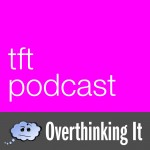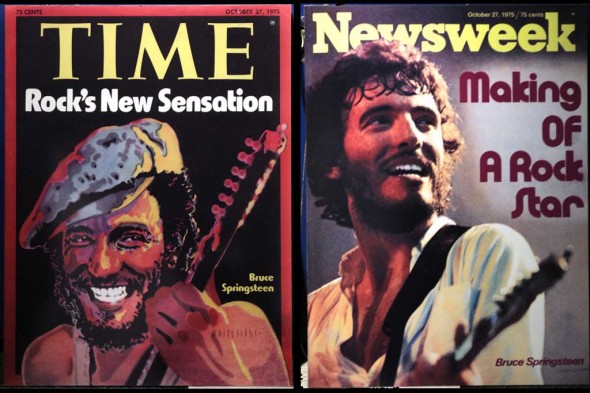 Matt and Ryan continue their historical march along the roots of indie pop music with a look at Bruce Springsteen’s Born to Run
Matt and Ryan continue their historical march along the roots of indie pop music with a look at Bruce Springsteen’s Born to Run
→ Download TFT Episode 99 (MP3)
Subscribe to the TFT Podcast
TFT Podcast on iTunes
TFT Podcast RSS Feed
Contact Us
Email us
(203) 285-6401 call/text
TFT Podcast on Facebook
@tftpodcast
Syllabus
- On Overthinking It
- Mark Lee on Jungleland and on Clarence Clemons’s sax solo
- Mark’s textual analysis of the album (along with NWA and Taylor Swift)
- John Perich’s Born In the USA: Our Most Misappropriated Patriotic Song
-
Born To Run on Wikipedia
-
Lyrics on Rock Genius
-
Pitchfork’s Perfect 10 Review of the album’s reissue
- Points of reference:
- “Be My Baby” (produced by Phil Spector)
- "I Think We’re Alone Now
- “Runaway”
-
Christgau on Springsteen’s relationship with the 70s Rock-Critic establishment
- Greil Marcus’s Rolling Stone Review
-
“Only the Lonely”, The Roy Orbison song name-checked on “Thunder Road,” on YouTube and on Wikipedia (see the bit near the bottom that talks about the song’s influnence on “Born to Run”)
-
A Slate piece on the making of Born to Run and its early reception
By fusing the pop sounds of the 1950s and 1960s to the generational desires of the 1970s, it defined its time and transcended it.
-
Steven Van Zandt on Wikipedia
-
Jane Mansbridge discusses Democratic Theory on YouTube

This episode was everything I hoped it would be and then some. Great TFT episode, or greatest TFT episode?
I don’t have a lot to add to your fundamental interpretation of the album and its realness–I think you pretty much nailed it–so I’m going to add a few things around the edges.
First off: the TFT-verse COLLIDES in this video of Jimmy Fallon singing “Born to Run” with the cast of Glee at the 2010 Emmys:
https://www.youtube.com/watch?v=mMfnqP62ReI
The performance seems particularly poignant/ironic in the context of Cory Monteith’s passing and the perceived decline in quality of the show Glee. But in the context of Fallon’s continuing rise in fame, more apropos and fitting of his upward career trajectory (bracketing aside his brief attempt at making it as a movie actor).
Matt/Ryan, would love to get your reaction to this.
(More to come later. The bossman is giving me hell and I need to get to the
factoryoffice.)Right! I had seen that when it aired (I think I was still watching Glee back then), but had totally forgotten about it.
Fallon actually did a different cover of Born to Run recently, with the Boss himself, rewritten to be about Bridgegate:
https://www.youtube.com/watch?v=VKHV0LLvhXM
Fallon’s impression is pretty great, which makes it pretty surreal to see them side-by-side, dressed identically.
Diehard Springsteen fans will definitely want to watch the documentary on the making of Born to Run: “Wings for Wheels.” The whole damn thing is on YouTube:
https://www.youtube.com/watch?v=Hwkt6L_vY-I
This came bundled with the 30th anniversary box set for the album. It’s been years since I’ve seen this, but I do recall there being plenty of scenes from the recording studio/mixing room that show The Boss hard at work/slave-driving the rest of the musicians.
This was a great episode!! Really enjoyed it. This is one of my favorite albums, and you guys had so much material going on it that, while I felt compelled to butt in here and there, I left quite satisfied.
I don’t know if it was because I grew up in New Jersey, but I felt like when I first listened to this album I intuitively understood a lot of what was going on — the relationship with cars and highways, with the way people pair off at particular points in the various rites of passage, etc.
Two reactions I have based on my upbringing and my own context for the song —
— “Statelessness” is a weird thing to think about when you grow up in New Jersey. There really isn’t a place to go that isn’t part of the state. It’s just town after town after town, packed as close as they go. The state is all around you. It’s all as developed as possible. You never really feel like you’re going to end up like in the Book of Eli or something — I wouldn’t describe too many Springsteen characters who stay within New Jersey as possible “drifters.” Where do you drift to?
And to that you have to kind of step outside the idea of the state as the natural monopoly of coercive force. New Jersey qua New Jersey isn’t just a political entity — the Governor isn’t “in charge of New Jersey,” and Trenton is pretty far away from most places. It’s heavily commercial, there is a real sense that you have to get by however you can whether it’s right or wrong or within the rules or not, and there are strong cultural and political relationships with various sorts of extralegal activities.
And the kind of Jersey highway driving depicted in Born to Run isn’t about driving off into the Poconos or even into the Pine Barrens — they’re not going there. It’s really about achieving velocity, and it only lasts as long as the drive lasts. Remember that Jersey highways are crowded and windy and full of traffic, and you can’t go all that far without running into a jammed-up cloverleaf if you’re up north, or a jug handle if you’re further south.
What this all means is while Matt is definitely correct in that the running is “away” from something — there isn’t really the possibility of a Sons of Anarchy kind of outcome, when you actually get away and end up owning your own town among the Northern California redwoods. Eventually, you will stop, and then you’ll basically be where you started. The run itself is the journey.
There’s the possibility for romantic transcendent apotheosis or what have you — but you only get to “case” the promised land — that is, look at it out of the window of a moving car, with the hope of returning to it at some point that will probably ultimately be frustrated — although of course the human mind is capable of resilience to loss and despair and doesn’t necessarily need to take that truth for an answer.
In that sense, the Springsteen narrator is more of a Mosaic figure than a Christ figure — he’s people out of bondage toward this great new place, but he isn’t really going to get there himself. But he’s okay with that.
— The relationship with God in New Jersey rock songs is tricky. Because it really is a Christian place, but it’s a different sort of Christian place — where there’s a lot of different sorts of beliefs from a lot of different waves of immigrant groups, and there’s a lot of humility coexisting with braggadocio. And there’s not a lot of born-agains, it’s more new versions of various sorts of old orthodoxies. So when Bruce is saying that he’s not a hero, and that you’re waiting for a savior to rise from the streets and all that, I don’t think he’s really talking about himself any more than is usual for this sort of thing, even if his own journey is Mosaic or messianic. I think there’s a sort of disposition you can adopt toward a saving deity where it informs how you feel about stuff, and about what is possible. You see a lot of similar stuff in Bon Jovi songs — “Livin’ on a Prayer,” “Keep the Faith,” etc. I guess the question is whether the sense of place associated with all these songs, as well as the sense of time, really relates them, or whether me encountering all of them while living in New Jersey was a coincidence.
Also, as a New Jerseyan, I found your identifying of The Jersey Shore as culturally related to the experience of the teenagers in Jungleland to be pretty offensive. I mean, obviously it’s offensive, it’s an absurd joke, that’s the point. I laughed. But it doesn’t really connect.
It’s worth noting that only two of the cast members from Jersey Shore are actually from New Jersey (and not the famous ones) — most of the cast is from New York City (Staten Island in particular; it’s a very Staten Island-ish show), Snooki is from a bit upstate, and Pauly D is from Rhode Island.
Bruce Springsteen grew up in the boardwalk towns of the Jersey Shore, which means he saw them out of season. And that’s really the difference. The Jersey Shore is about the Jersey Shore in-season — the people traveling to it, the suspension of reality that takes place when you’re on vacation — this massive dislocation of literally millions of people (I used to take pleasure in telling my Freshman year roommate that more people went to the Jersey shore on Memorial Day than lived in his whole home state).
But the people who actually live there have to deal with what the place is like when the tourists are all gone. And if I had to guess, I’d say that experience is a big part of the calluses you guys talk about on Springsteen’s mixing fingers.
And when I think about my cousins who still live down there, I think about hard work more than anything else — and hard work from a young age. And that’s what they don’t show you in The Jersey Shore.
Yeah, it was meant to be a horrible joke, so I’m glad it succeeded at that (That was me, right? It is usually Matt who says the horribly offensive things, so in my mind I’m attributing that to him, but I actually think it was me).
I’m actually now really interested in the interactions between young people who grow up in and around the Jersey Shore and visitors, both now and during the time that Springsteen grew up there.
Part of what was in the back of my mind is that what has gone on as the Shore has become more of a destination is that there has been at least some assimilation of the young people who live there to some of the cultural markers that we associate with the Jersey Shore TV show, in part transmitted through social interactions during leisure time.
But now I’m wondering if it is a lot more separate than I was imagining. I’m sure it may even vary a bit from town to town, based on the general socioeconomic status/place of origin of the visitors. Very interesting.
And I’m glad you liked the episode, and thanks for adding a lot of the details of how the album relates to your own experience!